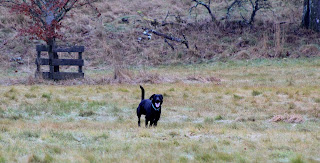Being a racing broadcaster must be one of the
hardest jobs in the world. This is because racing people are passionate about
and protective of their sport, excessively opinionated, and often unconvinced
by change. Everybody knows what racing should look like and everyone secretly
dreams of the glory days of Sir Peter O’Sullevan.
I was one of those people, in the turbulent
days when Channel 4 Racing gave the job to a new outfit. There would be changes, and secret technology, and,
help us all, gimmicks. I at once
gathered up all my toys and hurled them from the pram. I did not want gimmicks.
I did not want special touch-screens. I wanted Alastair Down, with his
shambling dress sense and his poet’s heart. I wanted re-runs of every single
race and more shots of the horses in the paddock, going down, in fact anywhere.
If a ravishing thoroughbred so much as pricked her ears, I wanted a shot of it.
I could not bear the sight of Jim McGrath
looking rather lost and forlorn since he no longer had his great compadre beside
him. How could they deprive him of John Francome, greatest jockey and greatest
broadcaster, whose dry-as-a-bone asides and lyrical voice harked back to the
days when he and the noble Lord Oaksey used to marvel over Desert Orchid’s
impossible leaps? I felt an injustice had been done to the suave and smiling
Mike Cattermole, who had once had to do battle with the rudest owner in racing.
There must have been nothing else to cut to and there must have been a frantic
producer yelling in his ear ‘you’re coming into the final furlong’ as
Cattermole manfully struggled to get a single polite word out of the taciturn person,
before tottering away, a broken man. And
after all that, there was no place for him on the new team.
So I yelped and howled and complained. More horses, I bawled on Twitter; no no not another vapid celebrity interview.
Then, slowly, slowly, something unexpected
started to happen. I began to see that although the old band was no longer in
town, there were some new stars. Nick Luck, quietly and without fuss, turned
into one of the most polished broadcasters in the business, with his glinting
humour and his excellent suiting. Mick Fitz stole into my heart with his
twinkly eyes and his years of experience and his love and knowledge of the
thoroughbred. In Alice Plunkett, the new Channel 4 had unearthed one of the
most natural onscreen talents I’d seen in years: completely authentic,
unapologetically enthusiastic, and unafraid of emotion. Simon Holt, who had
survived the change, developed into the most heart-stopping caller of a race
since the legendary O’Sullevan. There are other good commentators out there,
but he had that little extra something which I can only call soul. He
understood and admired the grand fighting qualities of the horses he was
calling and hung out more flags for the genuine and the brave.
Clare Balding stepped up to make the big
occasions as splendid as they should be, combining her trademark
professionalism with the love of horses she inherited in her cradle. I even
started to like some of the more eccentric stuff, like when Rishi Persad, with great determination and good humour, trained to take part in a charity race. The behind-the-scenes features – visits
to Frankel at stud, or the maestro that is Aidan O’Brien at Ballydoyle – were beyond
price. Jim McGrath stopped looking lonely and started to make jokes again.
I had to admit that I had been entirely
wrong. I gathered up my toys, put them back in the pram, and began to enjoy
myself.
And now there is to be another great change.
I’m not going to make the same mistake again. I’m going to give the new lot a chance
and be on their side, because I love racing so much it makes me cry (literally)
and I want it to succeed.
All the same, I feel a little melancholy
today, as Channel 4 and the old guard have their last hurrah. If you watch
racing every week as I do, these people become like family to you. I’ve seen
them wrangle with the unexpected and go on smiling through the pouring rain and
keep the show on the road even when there are only three wheels on the wagon.
They love the game as I do, and they brought it flashing into my quiet Scottish
room with verve and enthusiasm and passion. So I do thank them and I will miss
them and I put up my hands and say: I was wrong. That start might have been a
little bit glitchy in places, but as the race went on it developed into
something fine. And everyone, from the headline act to the most
behind-the-scenes runner, deserves credit and gratitude.













